In her 2016 book My Own Words, Supreme Court justice Ruth Bader Ginsburg often refers to the importance of collegiality. In a speech at Stanford in 2013, she said, “What holds us together is that we revere the institution for which we work. We know that we must maintain a high level of collegiality.”
In the theatre field, which is arguably not nearly as controversy-prone as the Supreme Court, we have Theatre Communications Group to promote collegiality among ourselves, while also deeply addressing timely challenges at its annual forums and conferences. TCG’s annual Fall Forum on Governance, this year titled “Turning the Tide,” took place over the weekend of Nov. 10-12 in New York City, and was attended by nearly 250 theatre professionals and board members from across the country. Over the course of three days, plenary and breakout sessions took place in mid-town and primarily covered three main subjects:
- Leadership transitions, a particularly hot topic this year
- Audience engagement and community development
- Rethinking the field’s traditional business model
Materials, including the agenda, the attendance list, and bios of all the speakers, can be found here, and select plenary and breakout sessions were livestreamed on TCG’s Facebook page, where they reached a global audience (they are archived for viewing any time here).
First Fun, Then Facts
For the third year in a row, the Forum was kicked off in the relaxed setting of Joe’s Pub at the Public Theater. It often felt like a college reunion, as folks who haven’t met for a long time greeted each other ebulliently. An eavesdropper could catch snippets of conversations, ranging in subject matter from the recent wave of sexual harassment scandals to industry trends.
Welcoming remarks from TCG executive director Teresa Eyring and representatives from the Public started the brief presentation portion of the evening. The highlight of the gathering was a wonderful performance by the Brooklyn-based documentary theatre group the Civilians, in tribute to their founding associate artist Michael Friedman, who died suddenly in September of AIDS at the age of 41. Three artists performed songs from the troupe’s 2015 Off-Broadway musical, Pretty Filthy, about the adult entertainment industry, for which Friedman wrote the songs. Highlights included Steve Rosen, outrageously funny singing “These Girls,” and Luba Mason, heart-melting with “Beautiful.”
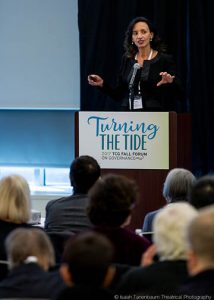
It was down to business first thing Saturday morning. After a blessing and acknowledgement of the land, following Cherokee tradition and beautifully led by Joan Henry, Zannie Giraud Voss, director of Southern Methodist University’s National Center for Arts Research, got our brains in gear early with highlights from Theatre Facts 2016, TCG’s latest report on the attendance, performance, and fiscal health in the U.S. professional not-for-profit theatre field, which Voss co-authored. Particularly noteworthy trends illuminated by Voss were:
- For the 5-year period from 2012 to 2016, total expense growth surpassed inflation by 10.5 percent. Every category of expenses outpaced inflation, creating more pressure on revenue to keep up.
- Growth in total income did exceed growth in total expenses, thanks to healthy growth in contributions (22.3 percent, after adjusting for inflation).
- Average ticket income growth lagged behind inflation by 1.2 percent, while growth in earned revenue from sources other than tickets (such as rentals, investment income, concessions, etc.) outpaced inflation by 48.2 percent.
- Fewer single and subscription/membership tickets were sold in 2016 than in 2012, while prices increased.
- Contributions by individuals other than trustees increased by nearly 19 percent from 2012, and that of trustees increased by just over 100 percent (go, trustees!).
One of my favorite presentations of the weekend followed. Titled “Why Not-For-Profit Theatre?,” it was prepared by Roche Schulfer, executive director of Chicago’s Goodman Theatre, in collaboration with Goodman trustee James Annable. Schulfer harked back to the early days of the regional theatre movement and the publication of Baumol and Bowen’s seminal work, Performing Arts—The Economic Dilemma: A Study of Problems Common to Theater, Opera, Music, and Dance. In addition to describing the immense success of the relatively young (50-plus years old) resident theatre movement, Schulfer talked about the persistent challenges for the performing arts as laid out by Baumol and Bowen.
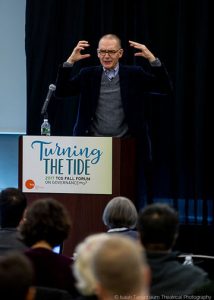
One challenge he spoke about is “cost disease,” a term for arts organizations’ inability to incorporate the technology-driven productivity gains of the larger economy, since the artistic labor itself is the product. As Schulfer put it, “It takes the same number of actors and musicians to perform Shakespeare and Beethoven in the same amount of time that it did when these works were created.” Pressure on wages drives expenses beyond inflation, while ticket prices and sales are tapped to fill the gaps. One effect is a reduction in artistic innovation, as theatres are pressured to produce lower-risk hits for which audiences are willing to pay the high price. But in order to maintain the artistic missions for which these theatres were founded—as community assets and alternatives to the commercial theatre—ticket prices must be affordable for a broad and diverse audience.
Additionally, contributed income is crucial in order to prevent an overdependence on earned income. Schulfer further underscored that the pressure to raise money is not a sign of poor management, but rather a crucial necessity for mission-driven organizations. (His full presentation, as well as other presentations from the Forum, can be found here.)
Vicki Reiss, executive director of the Shubert Foundation, then insightfully observed that development staff leaders are often the third or even second highest paid individuals at theatres that apply for funding from the foundation. That underlines the high importance placed on fundraising, but it’s a trend, she said, that needs to be studied and addressed. She is also noticing “quiet adjustments to programming” in the direction of less risk-taking. Meanwhile, structural deficits, at one time the exception, have become more common in the hundreds of budgets she sees every year as contributed revenue is increasingly unable to meet ticket revenue shortfalls, even with less risky programming and occasional premium pricing.
Voss interjected, pointing out, “Consumers spend 11 hours a day watching a screen. How does this impact demand for our product? How do we counter that?” Suggested former Goodman board chair Jim Annable (who partnered with Schulfer on some of his research), “Explain the economics to your board members and donors. It gives them a mission, which is not to become Broadway. A board with a mission is a more energized board.”
Disaster for Lunch
There’s one kind of mission that boards would rather avoid at all costs: the rescue mission. One option for lunch conversation was “Disaster Management at Your Organization,” facilitated by Laurie Baskin, TCG’s director of research policy and collective action. This topic piqued my interest because it closely mirrored my experience at Bucks County Playhouse in New Hope, Pa., after Hurricane Sandy. Baskin started by urging everyone to respond to the action alert emails TCG sends out periodically regarding policies our government is working to pass. (If you do not currently receive TCG’s action alerts, you can sign up here.)
The kinds of disasters discussed over lunch included wildfires (Oregon Shakespeare Festival recently had to cancel nine performances due to wildfires in the Rogue Valley), terrorist attacks (this recent article was distributed), and harassment (every organization needs to have a plan in place; see this resource). Baskin distributed TCG’s “Action Plan for Crisis,” which, though it dates from 1998, is still surprisingly relevant. The managing director of Houston’s Alley Theatre, Dean Gladden, attended the lunch gathering, and he described how the folks at the Alley handled Hurricane Harvey at the end of August, during which Houston got 50 inches of rain in just four days, resulting in flooding, power outage, the loss of their server, and a fire. The two pieces of advice he would give to anyone experiencing a disaster of similar magnitude are: First, communication is vital (have an emergency call list), and second, act quickly.
He also recommended that every organization have business interruption insurance; a discussion of other types of insurance that are available ensued, from active shooter insurance and to cyber insurance. A risk assessment committee of your theatre’s board should be formed to make sure the organization is fully covered and that the right emergency plans are in place.
Baskin offered to gather every theatre’s policies on these various challenges and post them on TCG’s website. You can email yours to her at lbaskin@tcg.org.
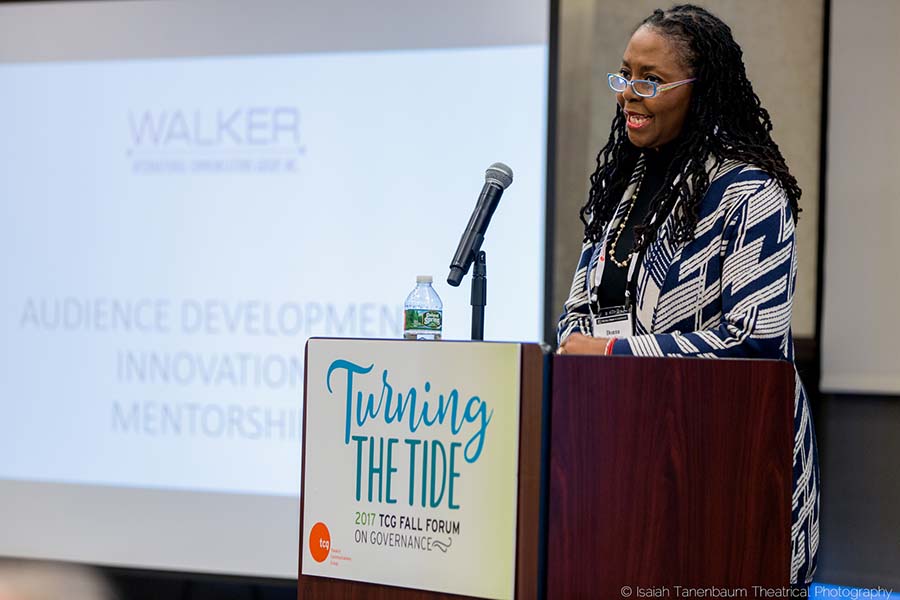
Engage, Listen, Share
In Saturday’s second plenary, Donna Walker-Kuhne, founder of Walker International Communications Group, talked with equal urgency about the goal of attracting audiences of color, which has been a priority in the field since the 1990s, and today’s growing emphasis on community engagement. She said that our level of commitment to reach underserved audiences needs to be treated as if we were students working toward achieving a degree—it needs to be that intense and deliberate. “Unconscious bias is real,” she noted, “and can come in various forms.” She also noted that while we may tend to put people in boxes, we instead need to ask, “What is the breadth of what someone can bring to the arts?”
Community engagement efforts interest funders, she pointed out, citing the human resources company ADP’s support of the New Jersey Performing Arts Center’s community engagement program as an example. (If ADP gets an onslaught of proposals soon, we’ll know why!) She noted the preponderance of affinity groups in corporations and asked what we are doing for each group of individuals.
“This work takes time—the culture of change is slow,” she conceded, but added, “This is a moral imperative.” We are in the midst of a global cultural renaissance, she said, and we need to make sure that every aspect of our work reflects the audience we serve. “Let’s be the storm together,” she concluded.
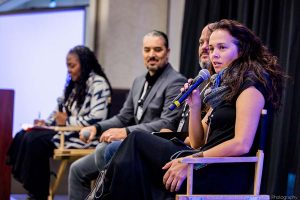
Walker-Kuhne then participated on a panel moderated by Raymond Bobgan, executive artistic director of Cleveland Public Theatre, along with Larissa FastHorse, playwright and co-founder of Indigenous Direction, and David “dstew” Stewart, director of production at the Guthrie Theater, on the topic of prioritizing relationship-building and specificity in audience and community engagement work. Stewart said that production “needs to be more proactively active, rather than just implementing the plans that are handed to them.”
FastHorse talked about the groundbreaking collaboration Indigenous Direction had with the Guthrie, noting that while you may think you have no relationship with the indigenous community, in fact, by virtue of living the U.S. you have a deeply negative relationship with indigenous people whose land was stolen from their ancestors 400 years ago. “There is a huge amount of distrust, and we as artists must listen to this community,” FastHorse insisted. “Our organizations’ trustees play an important role in addressing this.”
In the afternoon portion of Saturday’s meetings, I attended a breakout session called “Banding Together: Is the Future of our Business Model in the Sharing Economy?” Three organizations—Kranzberg Arts Foundation in St. Louis, ArtsPool of Brooklyn, and CultureWorks Commons Management of Philadelphia—discussed innovative resource-sharing programs during what they called the “Uber-ization of the economy.”
Thaddeus Squire from CultureWorks summed up the philosophy nicely, saying that we should not think like The Hunger Games. Instead, he said, “We must get out of the scarcity paradigm. It’s killing us.” He added, “Our endgame is human well-being, not output. This has led to a welcoming effect for organizations that may be marginalized in our current system.” He pointed to the Nonprofit Centers Network in Denver as an excellent source for learning more about robust sharing practices.
Succession Sessions
Perhaps the most timely plenary of the Forum came next. “Sea Change: Rethinking Leadership and Transitions in a Pivotal Moment for the Field” spoke to a moment in which multiple artistic director and managing/executive director positions are opening up; several significant searches are already in progress or near completion. Moderator Emilya Cachapero, director of artistic and international programs at TCG, opened by making the following points:
- The wait is long for someone who is in the leadership “pipeline”
- There are more qualified candidates than there are positions available
- Most of the focus is on recruitment and hiring rather than staff retention
- For an organization undergoing a transition, is its culture ready for change?
- There is inadequate support for longtime workers in the field to help them transition to the next stage of their careers
- There is an assumption from boards and staffs that the best course is stay on the same path
- Artistic directors are often the ones who need to close big gifts but must balance being an artist and doing fundraising; in some cases, 90 percent of an A.D.’s time can be spent on fundraising and other non-artistic areas, leaving only 10 percent for artistic responsibilities
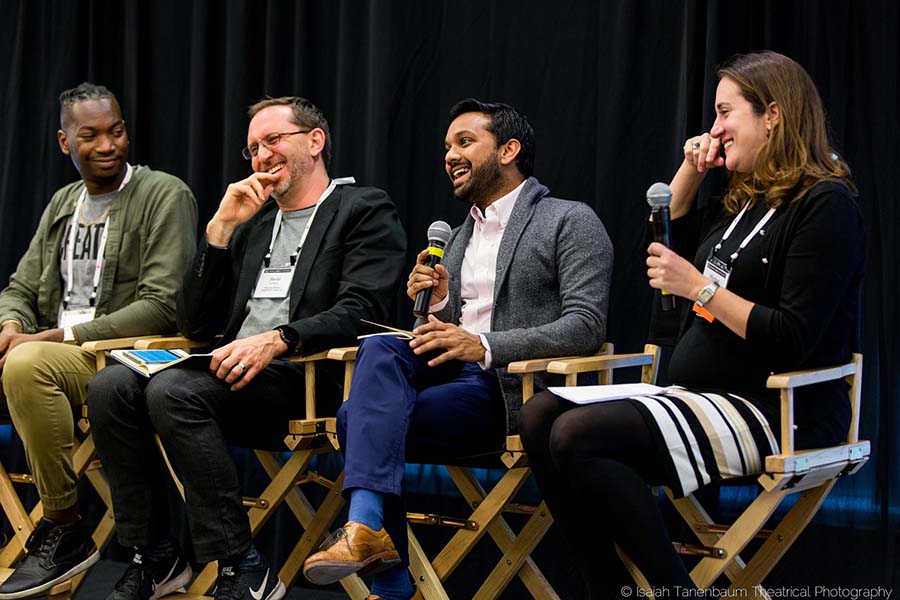
Panelist Nijeul X. Porter, an artEquity strategist/SOZE producer, talked about “leading interculturally.” He pointed out that there is a large population of people whose skills can be of great benefit to a theatre company, but who may not even be applying for positions. He cautioned, “There is a generation of young people who want to work in theatre, but the culture is not set up for them to succeed, so they are moving to other spaces.”
Co-panelist Meghan Pressman, managing director of Woolly Mammoth Theatre Company in Washington, D.C., verbalized some of the struggles that she had during her period of acclimation there. “Change is dramatic and hard and personal and internal,” she said. “Part of your new job might be to supervise a staff member who predates you. Perhaps you didn’t get their ‘vote’; maybe they wanted your job. Support systems must be in place, and you need to take care of yourself.”
One of Sunday’s final breakout sessions took the succession theme further. “The Search Process: Ensuring Inclusivity by Thinking Outside the (Check) Box,” moderated by Kelvin Dinkins Jr., assistant dean at the Yale School of Drama, featured board search committee members Linette Hwu (Woolly Mammoth) and Jennifer Miller (the Guthrie), and organization leaders Mike Schleifer (Atlanta’s Alliance Theatre) and Stephanie Thompson (Ten Thousand Things Theater Company in Twin Cities), all of them recently or currently engaged in leadership searches. Woolly Mammoth and the Guthrie both used search firms (actually, the same one: Management Consultants for the Arts, led by Greg Kandel).
One of Dinkins’s questions focused on the dearth of women leaders as identified by the Wellesley Centers for Women’s 2016 study, “Women’s Leadership in Resident Theaters.” Was organizational culture being addressed in the search process? Was unconscious bias training being done? The Guthrie’s Miller said that her board talked about Equity, Diversity, and Inclusion (EDI) at every meeting but hadn’t done any formal training. They ultimately did hire a person of color as their new artistic director (Joseph Haj), and strove to set him up for success as much as possible, including introducing him to the community, and organizing a listening tour for him to travel throughout the state of Minnesota.
The Alliance’s Schleifer pointed out that most nonprofit theaters are run by white men, including himself (his artistic director is Susan Booth, a white woman). He admitted that it was a steep learning curve to truly make room for others, and encouraged everyone to take the Harvard University Implicit Bias Test.
Ten Thousand Things’s Thompson reported that they have a “transition committee” to find outgoing artistic director Michelle Hensley’s replacement, as opposed to a simple “search committee.” The transition committee includes three sub-committees, all of which have EDI as an important element: an identity sub-committee, which focuses on articulating the pillars of the organization (beyond the mission) that would keep the organizational values in mind during the process; a search sub-committee; and a transition sub-committee to make sure that whoever is hired is successful. One of the company’s board members, an HR specialist, keeps the question of implicit bias in the forefront of all conversations to ensure equity not only in hiring but in the workplace after hiring.
Hwu reported that folks at Woolly Mammoth did implicit bias training, and received a grant from the Weissberg Foundation that allowed them to challenge the organizational culture and hold the mirror up to themselves.
Over and Out
Earlier that day, Devon Berkshire, TCG’s director of conferences and fieldwide learning, co-facilitated with her TCG colleagues Elena Chang and Hannah Fenlon a discussion around “Gender Equity in Theatre: Thoughts from the Berkshire Leadership Summit.” It centered on last month’s conference, hosted by WAM Theatre in Lenox, Mass. (details here, video here).
Members of the summit’s steering committee discussed how the gathering came to fruition largely as an organic outgrowth of the Women’s Leadership Project. Chang and Fenlon presented takeaways from the conference, agreeing that it served as a springboard for a larger national conversation. The breakfast conversation was “ally inclusive,” meaning, in the simplest of terms, that allies of women (i.e., men) were welcome and were present and part of the lively discussion.
Lively discussion, meaningful dialogue, and, yes, collegiality were all on tap at this year’s Fall Forum. Not that there was unthinking unanimity: I heard one first-time attendee remark on the wonderful diversity of people represented by the trustees present, to which a veteran responded that the board members in attendance unfortunately did not represent an overall cross-section of regional theatre boards. There is much work to do to make the American theatre a better place for its artists and for the world. The Fall Forum was further evidence of TCG and field’s earnest commitment to their missions and ideals. The great work continues.


